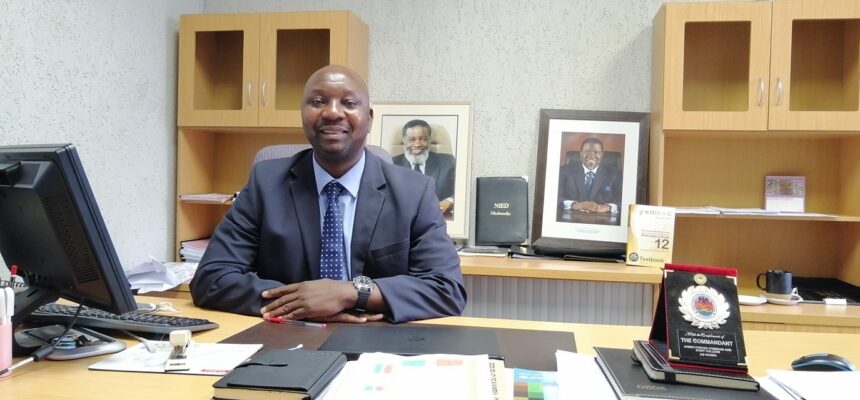The Ministry of Education, Arts and Culture has disclosed that 17 teachers from various schools across Namibia are being investigated for engaging in sexual relations with students this year.
The ministry reports that only four cases have been concluded and charged, while the rest are still under review by the Public Service Commission.
Director of the National Institute for Educational Development Patrick Simalumba recently told Desert Radio that 1% of pregnancies in schools involve teachers, with a majority occurring during the December holidays.
“There are various factors contributing to school dropout numbers and schools usually conduct follow-ups to determine the reasons. For instance, in 2019, we had more than 4 000 pregnant schoolgirls. If one were to claim that the dropout rate was about 10 000, then the 4 000 pregnant pupils would be included,” Simalumba said.
Between 2020 and 2022, there were 22 sexual relationships recorded between teachers and pupils in the country.
Education executive director Sanet Steenkamp is on record saying that the education ministry has a policy to induct teachers after being appointed before they begin teaching.
“During this induction, they are introduced to a Code of Conduct for Teachers which explicitly states that engaging in sexual relations with pupils is prohibited,” said Steenkamp. Steenkamp yesterday told The Namibian that this year, the ministry conducted a full investigation into 17 cases of teachers abusing their power, by engaging in sexual relations with pupils.
“This is not tolerated and is against the code of conduct for both teachers and pupils. Four of these cases have been completed with discharges from public service, as approved by the Office of the Prime Minister.
“The remaining 13 are still under review by the Public Service Commission, with pending recommendations to the prime minister,” Steenkamp said yesterday.
“With teachers serving as in loco parentis, it is a disgrace that we still have so many cases of pupils being impregnated by teachers.
“The sad part is that many a time, pupils, after giving birth, withdraw from providing testimonies, and it becomes cumbersome to resolve the case.
“There has only been one case, due to technicalities, in which a teacher was not found guilty,” she said.
“We will continue to treat these matters with a strong sense of urgency. All due processes have to be followed.”
Steenkamp said with the intended establishment of a professional council, teachers would be held accountable much more efficiently.
Meanwhile, Simalumba said investigations have revealed that most pregnancies occur during the December holidays when pupils are with their parents and away from the hostels.
Simalumba maintained that the number of teachers implicated in relationships with pupils is very small, accounting for 1%.
With the upcoming festive season and the assertion that many pregnancies happen during school holidays, Simalumba emphasised the need for stakeholders such as churches and civil organisations to collaborate.
He said the ministry has strengthened life skills teaching in schools, covering topics like teenage pregnancy and bullying.
The University of Namibia’s Tawana Milinga, who conducted research into the behaviour of teachers, found that teachers’ behaviour and level of education were vital factors affecting the quality of teacher-pupil relationships, while the major factors were lack of physical resources and ill-disciplined pupils.
DROPOUTS AND EDUCATIONAL CHALLENGES
Simalumba acknowledged that some issues highlighted by the World Bank recently concerning school dropouts in the region are accurate.
He cited high repetition rates, especially for Grade 1 (17,3%) and Grade 4 (18%), attributing this to the absence of pre-primary classes at all schools.
Simalumba said the transition from mother tongue to English as a medium of instruction contributes to the challenges faced by Grade 4 pupils. Simalumba defended the use of the mother tongue as the medium of instruction in foundational grades (1 to 3), indicating that pupils grasp concepts more easily in their vernaculars during these stages.
To enhance synergy between parents and teachers, the ministry introduced a family literacy programme, teaching parents how to support their children during the foundation phase.
“English still remains a language subject although all the other subjects are in the mother tongue.
The issue of mother tongue instruction is so critical in the foundation phase. But if pre-primary was catered for, as I said, that could have been managed properly,” he said.
DROPOUT RATES
According to Simalumba, dropout rates are as follows: 0,5% for Grade 1, 0,4% for Grade 2 and 0,3% for Grade 3.
The dropout rate for Grade 8 is 6,5%, increasing to 7,6% in senior secondary. Overall, the dropout rate stands at around 8%, he said. The dropout rate from Grade 1 to junior secondary is not significant, he said. The World Bank’s reference to the Grade 10 failure rate pertained to the previous curriculum and current statistics show significant improvements, with about 80% of pupils progressing to senior secondary, he added.
POLITICAL SUPPORT
Simalumba commended the political leadership for supporting the delivery of quality education.
He said despite the need for more pre-primary classes, the Cabinet provided substantial support, allocating around N$700 million for the construction of 500 classrooms from April to August.
All these classrooms have been constructed and additional funds have been received, he added.



Leave a Reply